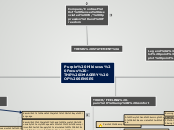Purple Hibiscus Focus -THE IMAGERY OF SENSES
SIGHT -colours & eyes
Eyes
Jaja and Kambili have a language of the eyes to communicate through their silence. Later in the book, Jaja shields his eyes mind behind a guarded curtain, ending their nonverbal communication.
Colours
Colour presents a spectrum and variety of feeling
and its sensual and symbolic interpretation.
Red
Associated with blood
Mama's blood after Papa abuses her -the trauma of witnessing the aftermath of her trail of blood causes the words in Kambili's textbook to stream into blood. Also any danger of displeasing Papa.
The blood in Papa's red face and eyes: his rage or uncontrolled warped sympathy when he punishes his family
Red Hibiscuses in Enugu Garden
Represents the domination and control of Papa
with its undertone of domestic violence
Purple
Purple Hibiscus symbolic of freedom
In Nsukka garden, its the introduction to
freedom which the siblings have never felt
before. Jaja takes a particular liking to the
flowers.
In Enugu garden, it represents to seed of
freedom planted in their oppressive household
as the purple flowers grow despite the cold
conditions, symbolic of prevailing hope and
freedom.
Black
Symbolic of Fear
The shadow in Jaja's Eyes
The shadow shifts into Papa's eyes and it grows
Ash
Connects to to Ash Wednesday which proceeds Palm Sunday, the day "things fall apart" in the family. Ash means the destruction of their perfect facade. The burning of the ashes can be connected to Papa's burning rage that the family can no longer tolerate.
Yellow
Beauty, love,
Happiniess
Kambili's Yellow Flower
HEARING -silence & voice
Silence
symbolizes the oppression of their family
and the control over their words and actions.
It enunciates their fear of the consequences
for speaking out of line.
Kambili's and Jaja's
eye language
Kambili, Jaja, and Mama
usually only speak to
compliment or supply calculated,
careful comments to please Papa
Kambili always has a self loathing
when she was not the one to say
something that made Papa pleased
Silence as tension
Subtopic
Silence also as a rebellious strength. After their
compliance to Papa is broken, their is new silence
filling the house:
PPC: Jaja purposely not
complimenting Papa's juice like the others
Speech
symbolizes the family's freedom of speech
and individualism and rebellion to conformity
PPC: Jaja talking back to Papa
after not taking communion.
Laughter
Associated with Aunt Ifeoma and her family:
represents freedom and ownership of emotions
and character.
PP: Kambili dreams of her laughter and is initially
startled and fascinated by it because alienated
and foreign to her. She does not even know her
own laugh. Later, she learns the freedom of laughter
Singing
Singing has always been looked down upon by Papa
and becomes something forbidden and seen as inferior
and uncivilized.
Singing represents a freedom from conformity
and a fearless, unapologetic proclamation of joy
and praise
PP: When Aunt Ifeoma's family starts singing in the middle of
prayer, Jaja and Kambili have a nonverbal debate of whether
to join or not. Jaja has an intense yearning to join, but Kambili, under the influence of Papa refuses him.
Igbo
Papa's uncivilized, uncontrollable rage
TOUCH/FEELING -pain & comfort
Pain & Abuse
A fiery and burning sensation is
associated with Papa and pain
Burning Love Sip
PP: Kambili's fiery pain after being
hospitalized by Papa
The poisoning of Papa?
Pressure and Suffocation
head and ears filling with pressure from stress and fear
Happiness & Comfort (foamy, hugs)
TASTE
Taste
The flavors of fear
Kambili's obsession with Papa's
approval is toxic
Punishment and Reconciliation:
Papa claims his punishment is for their own good,
but it carries a bitter taste
The flavours of freedom/love
Subtopic
Tasteless*
The numbness of pain and fear
PPC: Kambili cannot taste her supper
due to her shock and fear of Jaja and Papa's
conflict
SMELL
spice?
sweet?
